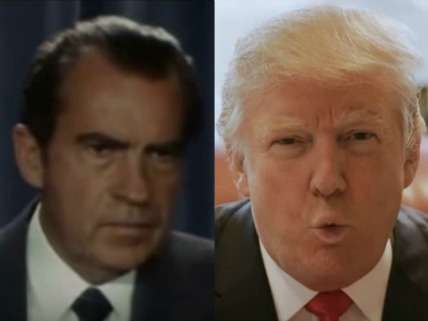Emulating Nixon, Trump Sounds Softer on Drugs Than Dukakis
The GOP's anti-drug plank is historically mild, reflecting a shift in public opinion.

Although Donald Trump is consciously modeling himself after Richard Nixon, this year's GOP platform underplays a prominent aspect of Tricky Dick's law-and-order appeal: his condemnation of the drug culture and the entrepreneurs who facilitate it. The 2016 platform devotes about 250 words to "Combatting Drug Abuse," which is five times as many as the 2012 platform but less than half as many as the 1972 platform. There is also a notable difference in tone. Republicans in 1972 declared that "the permissiveness of the 1960s left no legacy more insidious than drug abuse," noted with alarm that "marijuana had become commonplace" by the time Nixon began his first term, and unambiguously "oppose[d] the legalization of marijuana." This year, by contrast, the Republicans merely note that "in many jurisdictions, marijuana is virtually legalized despite its illegality under federal law." Presumably they disapprove, but they do not explicitly say so. Furthermore, they put marijuana "at the other end of the drug spectrum" from heroin, conceding a distinction that even Democratic administrations have been reluctant to acknowledge until recently.
Regarding the ongoing collapse of marijuana prohibition and the recent increase in heroin use, the 2016 platform says, "Congress and a new administration should consider the long-range implications of these trends for public health and safety and prepare to deal with the problematic consequences." It also mentions curbing "over-prescription of drugs" in response to "the misuse of prescription painkillers." That's pretty weak tea compared to what Nixon promised in 1972. "We pledge the most intensive law enforcement war ever waged," the Republicans said then. "We are determined to drive the pushers of dangerous drugs from the streets, schools and neighborhoods of America."
This year's drug policy plank also seems soggy compared to 1976 ("remove the pushers from the street and give them mandatory sentences"), 1980 ("a murderous epidemic of drug abuse has swept our country," representing "an intolerable threat to our society"), 1984 ("we reaffirm that the eradication of illegal drug traffic is a top national priority"), 1988 ("the drug epidemic…directly threatens the fabric of our society"), 1992 ("The Republican Party is committed to a drug-free America," which means "drug users must face punishment, including fines and imprisonment, for contributing to the demand that makes the drug trade profitable"), 1996 ("the Republican approach" to drug policy is "no legalization, no tolerance, no excuses," and it requires "a crack-down on users"), 2000 ("The entire nation has suffered from the [Clinton] administration's virtual surrender in the war against drugs"; federal prosecutors must "aggressively pursue drug dealers, from the kingpins to the lackeys"), and 2004 ("we must ensure that jail time is used as an effective deterrent to drug use").
In fact, the platform on which Trump is running looks soft on drugs compared to the Democratic platforms from those years, especially 1988 (when Democrats promised to "wage total war on drugs," which "pose a direct threat to the security of our nation from coast to coast") and 1996 (when Bill Clinton bragged about fighting "an aggressive war on drugs" that imposed "the death penalty for drug kingpins," "force[d] drug users to get treatment or go to jail," and promoted "successful drug-education programs like DARE"). The Democrats, who now talk about creating "a reasoned pathway for future legalization" of marijuana, have come further than the Republicans, who did not even see fit to endorse a federalist approach to legalization (which Trump says he favors) or support states that allow medical use. But it is no small thing that the Republicans' official stance on drug policy sounds as mild as it does even when their nominee is trying to copy Nixon's playbook.
As usual, the two major parties are following public opinion rather than leading it. According to Gallup, public support for legalizing marijuana rose from 15 percent in 1972 to 58 percent last year. A 2015 poll conducted by Public Opinion Strategies found that more than three-quarters of Americans oppose the mandatory minimum sentences that Democrats as well as Republicans long portrayed as a vital part of the cure for "the drug plague." These numbers help explain why Republicans this year did not make a point of opposing marijuana legalization (an idea they used to call "morally abhorrent") and actually offered some support for sentencing reform. When the political benefits of panicking decline, even Republican drug warriors learn to calm down.
In an interview with Anthony Fisher at the Republican convention yesterday, self-described "dirty trickster" Roger Stone, who sports a Nixon tattoo on his back, said the war on drugs was "Nixon's greatest mistake." Stone, a Trump supporter, claims the presumptive nominee, who back in 1990 said legalization was the only way to win the war on drugs (a position he now disavows), has "enormous skepticism about the war on drugs."


Show Comments (15)